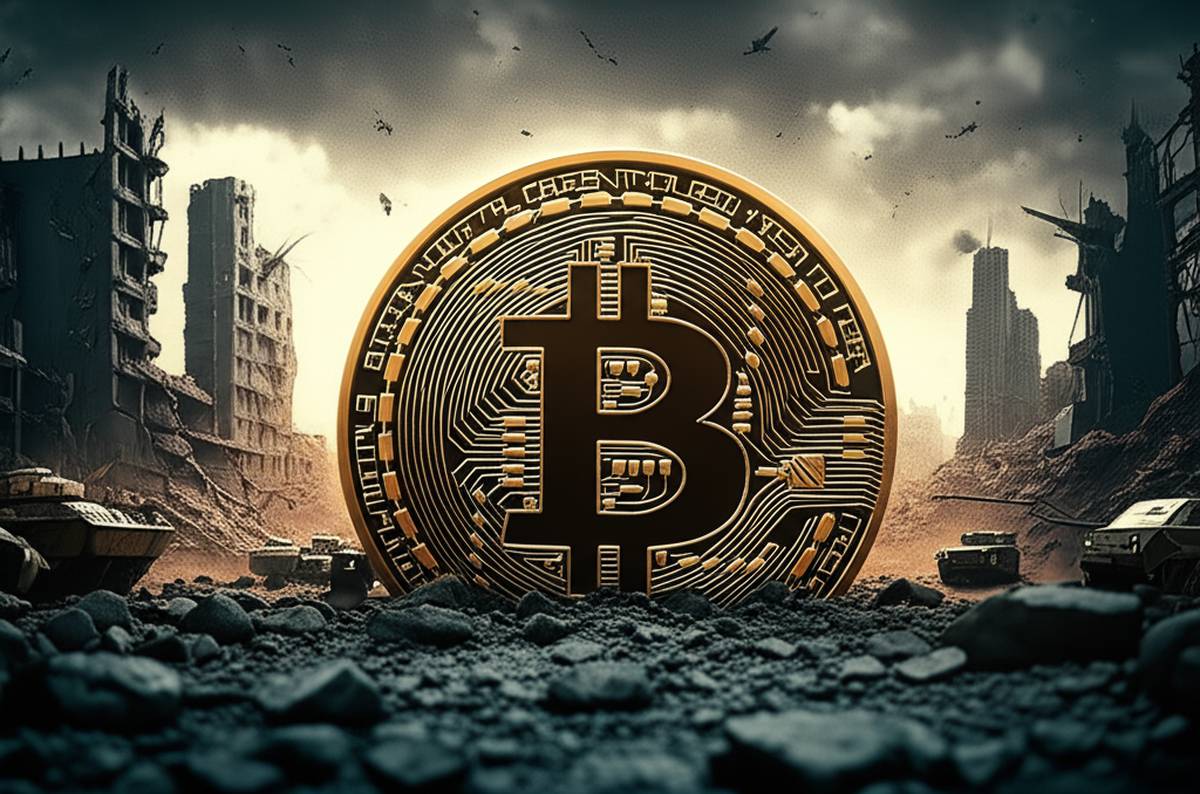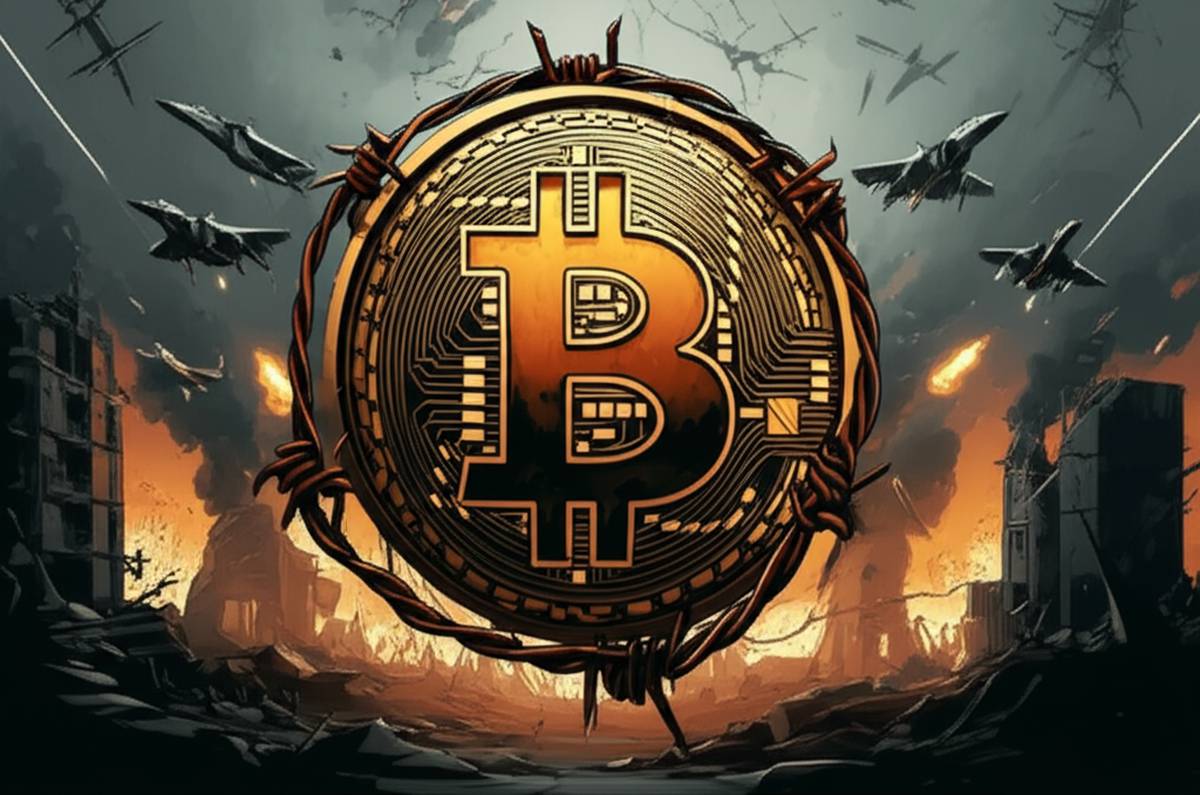Welcome to a crucial exploration of the intersection between the digital realm and global geopolitics. In this article, we’ll delve into the complicated relationship between Bitcoin and wars, analyzing whether Bitcoin acts as a safe haven during times of conflict, or if it presents new avenues for financial instability and even exploitation. We aim to provide a balanced perspective, empowering you with the knowledge to navigate these turbulent times.
The Allure of Bitcoin as a Safe Haven During Conflict
In times of political and economic turmoil, people often seek safe havens for their wealth. Traditionally, assets like gold, the Swiss Franc, and US Treasury bonds have served this purpose. But in the digital age, Bitcoin has emerged as a potential contender. The decentralized nature of Bitcoin, independent from governments and traditional financial institutions, makes it attractive to those seeking to protect their assets from seizure, inflation, or capital controls imposed during wars.
Decentralization: A Double-Edged Sword
Bitcoin’s decentralization is its core strength, but also a point of vulnerability. It makes it resistant to censorship and control by any single entity. However, this also means there’s no central authority to regulate or protect users from fraud or theft. During wartime, when legal and regulatory frameworks may be weakened or non-existent, this lack of oversight can be particularly risky.
Bitcoin’s Performance During Geopolitical Events
Looking at past geopolitical events, Bitcoin’s price action has been mixed. Sometimes, it has seen a surge in demand during periods of instability, suggesting a flight to safety. Other times, it has fallen alongside traditional assets, indicating its correlation with broader market sentiment. The relationship is complex and influenced by numerous factors, including the specific nature of the conflict, the global economic climate, and investor sentiment.
The Dark Side: Bitcoin as a Tool in Modern Warfare
While Bitcoin can be a refuge for some, it also presents opportunities for illicit activities related to war. Its anonymity and ease of transfer make it attractive to those seeking to evade sanctions, finance terrorism, or engage in cyber warfare. Understanding these risks is crucial.
Sanctions Evasion and Funding of Illegal Activities
Sanctions are a common tool used by governments to pressure other nations or entities. However, Bitcoin can potentially be used to circumvent these sanctions, allowing sanctioned entities to continue accessing funds and resources. Moreover, the anonymity afforded by Bitcoin can be exploited to finance illegal activities, such as the purchase of weapons or the recruitment of mercenaries. It’s important to note that this is not unique to Bitcoin, and any financial system can be exploited.
Cyber Warfare and Ransomware Attacks
Cyber warfare is an increasingly prevalent aspect of modern conflict. Bitcoin is often used to pay ransoms in ransomware attacks, which can target critical infrastructure and government agencies. This provides a financial incentive for cybercriminals and can exacerbate the impact of conflicts.

Mitigating the Risks and Maximizing the Benefits
The relationship between Bitcoin and wars is complex and multifaceted. While it offers potential benefits as a safe haven and a tool for financial freedom, it also presents significant risks related to illicit activities and market volatility. To navigate this landscape effectively, we need to promote responsible adoption, enhance regulatory oversight, and foster greater financial literacy.
Responsible Adoption and Financial Literacy
Education is key. Individuals need to understand the risks and opportunities associated with Bitcoin before investing in it. This includes understanding market volatility, cybersecurity threats, and the potential for fraud. Furthermore, promoting responsible adoption involves using Bitcoin in a way that aligns with ethical and legal principles. Learn more about developing a strong money mindset to navigate these complex financial decisions. Consider starting here for foundational knowledge.
Enhanced Regulatory Oversight
Governments and regulatory bodies need to develop clear and consistent frameworks for regulating Bitcoin and other cryptocurrencies. This includes implementing measures to prevent money laundering, terrorist financing, and sanctions evasion. However, regulation should also be balanced with the need to foster innovation and protect individual freedom. You can explore more about wealth building strategies while staying informed about regulatory changes.
International Cooperation
Given the cross-border nature of Bitcoin, international cooperation is essential to address the challenges it poses. This includes sharing information, coordinating regulatory policies, and working together to combat illicit activities. Resources like Investopedia’s Bitcoin definition provide a solid foundation for understanding these issues.
Future Trends and Considerations
The role of Bitcoin and wars is likely to evolve in the coming years. As technology advances and geopolitical dynamics shift, new challenges and opportunities will emerge. Staying informed and adaptable is crucial.
The Rise of Central Bank Digital Currencies (CBDCs)
Central banks around the world are exploring the possibility of issuing their own digital currencies (CBDCs). These CBDCs could potentially compete with Bitcoin as a safe haven asset or as a means of payment. The implications of CBDCs for the Bitcoin ecosystem are still uncertain, but they are likely to be significant. To future-proof your income, consider exploring digital income opportunities. Unlock the potential of AI automation to streamline your work and life.
The Impact of Geopolitical Fragmentation
As the world becomes more fragmented and multipolar, the demand for decentralized and censorship-resistant assets like Bitcoin may increase. However, this could also lead to greater regulatory scrutiny and attempts to control or restrict the use of Bitcoin. Understanding life design principles is crucial for adapting to changing global landscapes.
Are you ready to take control of your financial future and build a life of freedom and impact? Join the Billionmode community and gain access to exclusive insights, resources, and tools. Subscribe to our newsletter today and embark on your journey to financial independence!
FAQ
Is Bitcoin a safe haven during wars?
Bitcoin’s performance during geopolitical events has been mixed. While its decentralization can be attractive during times of instability, its volatility and the potential for illicit activities also pose risks. It may act as a safe haven for some, but it is not a guaranteed solution.
How can Bitcoin be used in warfare?
Bitcoin can be used to evade sanctions, finance terrorism, and facilitate cyber warfare, such as paying ransoms in ransomware attacks. Its anonymity and ease of transfer make it attractive for these purposes.
What are the future trends for Bitcoin in relation to geopolitics?
Future trends include the rise of Central Bank Digital Currencies (CBDCs) and the impact of geopolitical fragmentation. CBDCs could compete with Bitcoin, while geopolitical instability might increase the demand for decentralized assets like Bitcoin, but also lead to greater regulatory scrutiny. Check out the blog for more articles.
Conclusion
The dynamic between Bitcoin and wars presents a complex landscape of opportunities and risks. While Bitcoin offers potential as a safe haven and a tool for financial freedom, its use in illicit activities and its inherent volatility cannot be ignored. By promoting responsible adoption, enhancing regulatory oversight, and fostering international cooperation, we can mitigate the risks and harness the benefits of Bitcoin in a responsible and ethical manner, ensuring its role in building a more secure and prosperous future for all.



